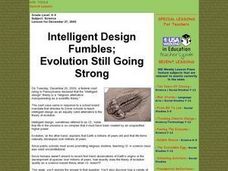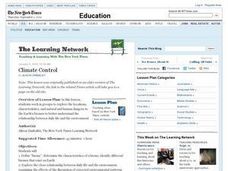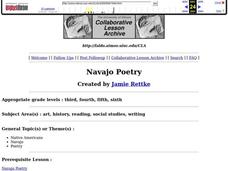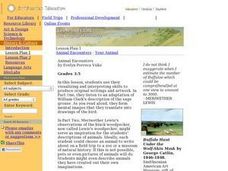Curated OER
Our Natural Resources
Young scholars investigate natural resources and man-made items. In this earth science lesson, students classify items from trash into man-made items or natural resources. Young scholars construct a flow chart to investigate the life...
Curated OER
Intelligent Design Fumbles; Evolution Still Going Strong
Students examine how all life is related and how species are classified. They also discover how traits are passed down from one person to the next. They examine the evolution the arthropod has going through.
Curated OER
Walden the Ballad of Thoreau
Young scholars role play to become familiar with the life of Thoreau. In this Thoreau lesson, students view a video of the Walden play about Thoreau. Young scholars perform and promote the play as a school event.
Curated OER
The Ocean Floor
Fifth graders discuss the process of sedimentation and the continental drift theory. They locate major structures on the ocean floor and they identify life forms at each level of the ocean.
Curated OER
Are Nanobacteria Alive: Sample Socratic Questions
Students comprehend the definition and uniqueness of life and its complexities. They examine what characteristics constitute a living organism. Students recognize the extent of the role nanobacteria play in the movement and molding of...
Curated OER
Climate Control
Students explore the locations, characteristics, and natural and human dangers to the Earth's biomes to better explain the relationship between daily life and the environment.
Curated OER
Are You Thirsty? The Effects of Pollution on Drinking Water
Discuss the availability of clean, plentiful water and the causes of water pollution. In groups, sixth graders discuss problem-solving methods for keeping water clean. They explore the function of water treatment plants and perform...
Curated OER
Change Through Time
In this evolution worksheet, students will complete a table by writing in the era and biological event based on 4 different time periods of Earth's history. Students will answer 8 fill in the blank questions based on the different origin...
Curated OER
Bite Sized Core Sampling
Students define the origin of rock samples and how surface core samples can tell us about the history and make-up of Mars. Candies are used as a Martian surface sample. Students study the samples and make a hypothesis about the cause of...
Curated OER
Understanding Greek Mythology
Students explore the role of Greek mythology in ancient Greek life. They discuss the origins of the Greek gods and goddesses, conduct Internet research, and present a project in the form of a dialogue between a Greek god and a human...
Curated OER
Where Do Your Veggies Grow?
First graders investigate the origins of vegetables. In this Science lesson, 1st graders identify where fruits and vegetables come from. Students describe how people utilize plants.
Curated OER
Birthday Customs
Students are introduced to the customs and origins of a variety of common birthday celebrations. They work in groups to research common birthday customs and history and then make individual books highlighting a custom that has meaning to...
Curated OER
Flowers Galore
Students create original works of art using their knowledge of Georgia O'Keeffe's artwork, flowers, pencils, crayons, and pastels in this K-6 Art lesson plan. The lesson plan includes Georgia O'Keeffe resource links and a recommended...
Alabama Learning Exchange
The Ocean Floor
Learners explore the ocean in this earth science lesson. They use the Internet to gather information on parts of the ocean including the beach, ocean floor, continental shelf, trenches, and the animals that inhabit these parts.
Curated OER
Wildlife Sampling-Capture-Recapture
Seventh graders simulate the capture-recapture method of population sampling using beans. In this biology instructional activity, 7th graders calculate the total population of beans in the bowl. They assess whether this method is...
Curated OER
Dinosaurs
In this earth science worksheet, students match each vocabulary term, that names something specific related to earth science, with its correct description found in the right column. They identify different types of scientists and various...
Curated OER
Assessment & Evaluation
Seventh graders study elapsed time, radioactive decay and half-life. In this time machine lesson students complete several activities and view a presentation.
Curated OER
Energy Defined
Fourth graders complete activities to study the sources of energy and forms. In this energy lesson, 4th graders discuss the origin of energy and define it. Students participate in several experiments to further study energy including a...
Curated OER
Getting to Know the Streets of Honolulu
Students practice identifying the streets names of Honolulu. Using a city map, they identify a main street and two intersecting streets. They research the origin of the name and complete a worksheet. They share their findings and...
Curated OER
Navajo Poetry
Pupils listen to Navajo poetry and create various responses to what they have heard. Students may create an illustration for the poems, create an original work of poetry, or write about how the poem relates to Native American culture.
Curated OER
Deer Tracks
Young scholars use satellite images to track to movement patterns of deer and examine deer behavior. They write stories about a day in the life of a field scientist.
Curated OER
Tools Make A Difference
Students compare and contrast older and newer types and designs of tools, and examine how the change in tools affected life along the river in the book, "A River Ran Wild." They classify the tools for cooking, hunting, farming, and...
Curated OER
Go West Young Man#148
Students determine the difference between immigration and emigration. They read and listen to books about emigration westward during the Gold Rush years. They examine life in Gold Rush towns while determining why gold is so valuable....
Curated OER
Animal Encounters
Students use their visualizing and interpreting skills to produce original writings and artwork.























